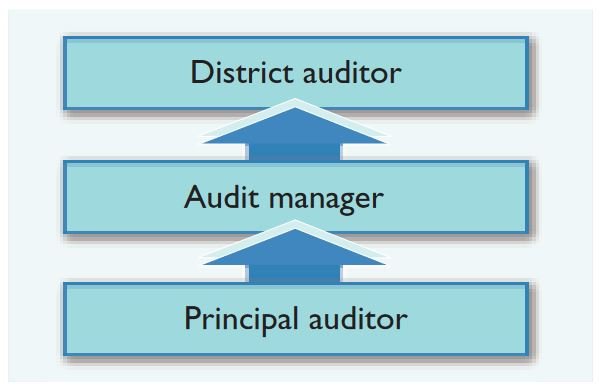Living in a safe community that provides such a wide range of public services is easy to take for granted. Even as students, the list of all the products and facilities that are provided for you is endless. The roads, schools and colleges, sports centres, parks, youth clubs, services of the police, hospitals, ambulances, teachers and nurses are all supplied by public money to create a certain standard of life.
An ‘audit’ is a formal examination of a set of accounts to see that they are true and fair. It is also a check for quality and efficiency. It involves a process of finding things out. In the public sector where public money has been raised from taxes and other sources, this is key as it helps to make sure it is used properly.
This case study looks at the work of the Audit Commission as well as the roles of some of the people who work for it. The Audit Commission is an independent public body that ensures public money in areas such as local government, housing, health, criminal justice and fire and rescue services is spent efficiently.
Although the Audit Commission is an independent body, it is accountable to the Office of the Deputy Prime Minister (ODPM). This means that its actions must be explained to the ODPM.

If they find any problems, the auditors and inspectors report to the people who make the highest decisions within that local authority. This is known as a process of governance. Decisions are then made to improve the way that money is spent and to provide better value for money that comes from taxation and other sources. This also means better services for the public.
The work of the Audit Commission is part of a wider process of making public services accountable. In addition to its audits and inspection role, the Audit Commission also gives an overall judgement on the quality of local government services. The way it does this is through its Comprehensive Performance Assessment.
The Audit Commission sees how well a local authority is delivering services and then gives it a star rating, with no stars for a council that is performing poorly to four stars for one that is a high performer. The star rating comes with a report that explains how it arrived at the grade. Local authorities with three or four stars have to undergo fewer audits and inspections. Auditors and inspectors need to understand the pressures on public services, and the challenges they face if the Audit Commission is to do its job well.
Those who work for an organisation need to know where they are going, as well as the direction that leads their organisation. This is often expressed as a mission statement. The mission of the Audit Commission is ‘To be a driving force in the improvement of public services. We promote good practice and help those responsible for public services to achieve better outcomes for citizens, with a focus on those people who need public services most.’
Working for the Audit Commission gives individuals an opportunity to help make local services better. This improves the lives of those who depend upon such services.
Within the Audit Commission, there are many different jobs with varying levels of duties. They may start in junior posts, where staff might be involved with a range of administrative activities. It is possible for them to move upwards to supervisory posts, where they might be managing teams of people.

A district auditor leads and manages a team of auditors within a region in the UK, while building relationships with the client. This will involve inspiring and motivating the team as they audit local authorities, report their findings to members of the public and make proposals.
There are three main areas in which the Audit Commission recruits. These are:
- Financial audit – Financial auditors are mainly qualified accountants. They work in teams with clients, such as local authorities. Their work will involve them using accounting standards to judge the effectiveness of public services, part of which may involve examining fraud and testing financial systems.
- Performance audit – These people will typically have worked in the public sector. They work with and support providers of public services in order to help them improve the quality of delivery.
- Support – The Audit Commission employs many others who are there to ensure that the core business is delivered well. Some of these people work in research posts and within internal finance. Others work in human resources, information technology, communications and legal.

The first project I was given was in the knowledge and information directorate. I was asked to produce a series of best-practice guides for local authorities, based on facts gathered by our field staff. My brief was…brief! I was just told to “make it happen”, but actually that’s the way I like to work. I hired teams of consultants to conduct the research and produce the first drafts. I also convened panels of internal and external experts, and redrafted the guides ready for publication.’
Helen has had job-related training and she has taken part in a development centre. This was a day of individual and group tests that gave her feedback on her strengths and weaknesses.
Arati – principal auditor
Arati studied law at the University of London. He joined the Audit Commission as a trainee auditor in the London region. He says: ‘From the outset, I was given a lot of duties, which included linking with a wide range of public bodies. Being flexible was crucial; I worked with different team leaders and managers on many diverse aspects of the Audit.
Aside from the audit of financial statements and government returns, we also take on reviews of clients on their legal, fraud prevention and corporate governance arrangements, and make recommendations accordingly. Within the course of four years, I had undertaken work for a wide range of clients. This included three London boroughs, two health authorities, eight NHS Trusts and a police authority.
As a trainee, I was funded to undertake my professional training through CIPFA (the Chartered Institute of Public Finance and Accountancy). The support that trainee auditors get is excellent. I never had to worry about books and course materials, as they were sent straight out to me.
Working and studying at the same time is hard, mainly during the summer when tight deadlines have to be met for health audits. However, the training programme is both challenging and first-rate. I qualified in June 2004 and was then promoted to the principal auditor.’
In order to use staff well, modern organisations focus their attention on specialist skills, such as those required by the qualified accountants who work for the Audit Commission. They also concentrate upon a range of other ways of behaving and doing their job. Having this broad focus helps an organisation reach its mission more easily.
Core competencies are the standards that people have to accomplish if they are accepted to perform for the Audit Commission at a certain level. The Audit Commission has a variety of core competency headings at a range of levels. These depend upon the particular role of each employee. For example, a competency profile at one level requires the following core competencies.
Each is split into very specific requirements that they need to undertake their role:
- understanding clients
- managing the business
- developing services
- using judgment
- communicating and relating to others
- being technically knowledgeable and informed.

Every member of staff at the Audit Commission has a personal development plan. Staff may be given on-the-job training in the workplace. This is where training courses and workshops are run for specific events.
They can also get the opportunity to do off-the-job training outside the place of work. The chances the Audit Commission provides for self-development may involve secondments of three to six months with clients, such as local authorities or the National Audit Office. There are also openings for employees to take professional qualifications, such as CIPFA.
The competency-based system and the personal development plan enable employees to take responsibility for their own growth. This means that the area in which they work uses and develops their talents. This results in high-quality output and work.
The Audit Commission has a vital role in helping to improve public services by auditing financial information, efficiency and value. To do this well, it needs good-quality staff, not just in the area of accounting, but also in a host of other different roles.
Competencies and training are all geared to ensuring that its activities and advice are of the highest quality. This is so everyone in society can benefit from its activities.

